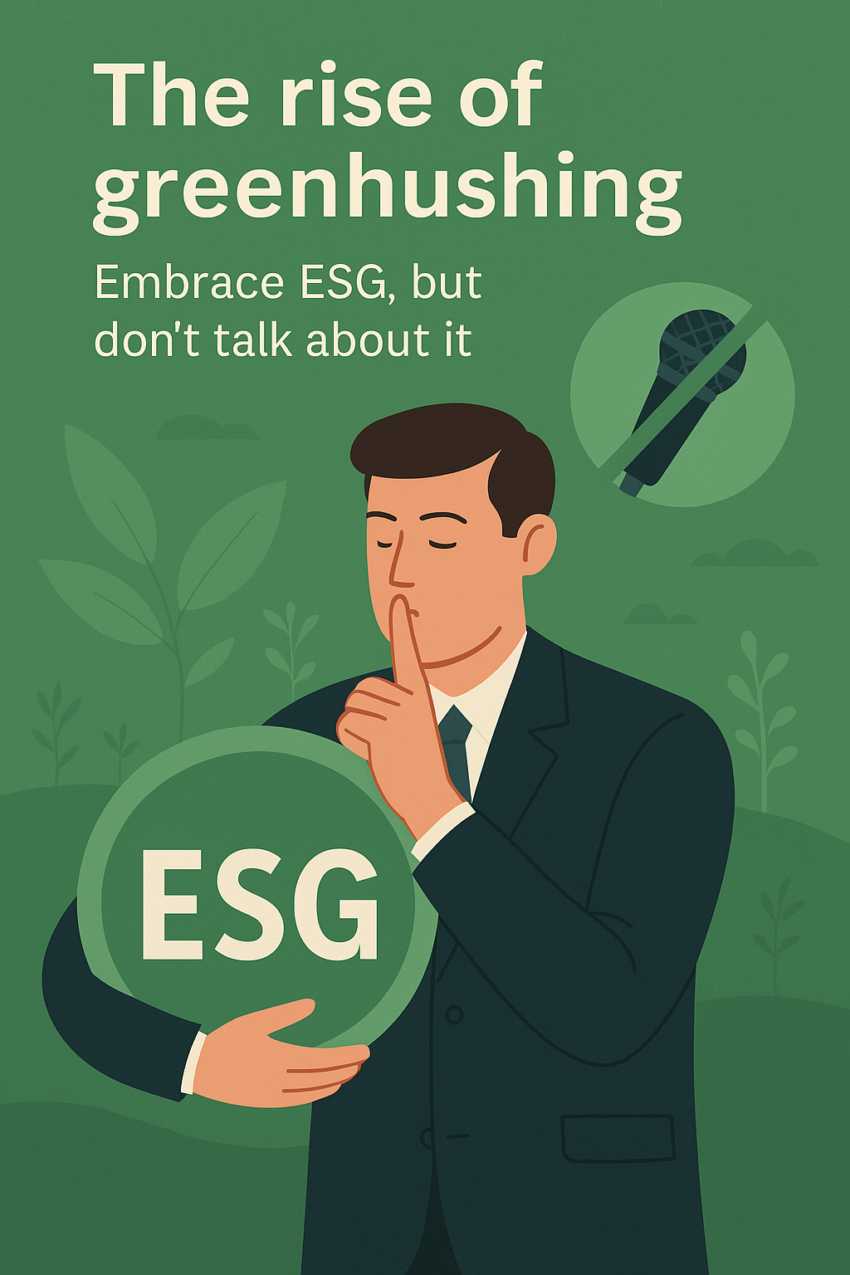In the footnotes of financial statements and the quiet corridors of compliance, something green stirs — unseen, unspoken, yet profoundly alive.
In today’s corporate world, where quarterly reports dictate direction and KPIs are the closest thing to gospel, a peculiar phenomenon has taken root — not in marketing decks or investor pitches, but in the margins of our ledgers and the silence of boardrooms.
It’s called greenhushing.
Unlike its notorious cousin, greenwashing, where companies boast of sustainability without substance, greenhushing is the act of doing good… but choosing not to say a word about it.
It’s ESG in stealth mode — and it’s sweeping through finance, accounting, and tax like a quiet wind through autumn leaves.
🧾 Where Numbers Whisper: Greenhushing in Accounting and Finance
Accounting has always been the language of business. But in a world hungry for ESG transparency, it’s also become the soul translator — where ethics meet earnings, and impact meets income.
So, where does greenhushing show up in the books?
In carbon-neutral audits that never make the annual report.
Sustainable investment re-allocations buried deep within the footnotes.
In tax credits for green energy that are claimed — but not showcased.
In supplier diversity initiatives kept confidential out of fear of politicization.
Finance teams are doing the work.
They’re integrating ESG into valuations, forecasting climate risk, calculating carbon costs, and even redesigning cost centers to reflect circularity.
But the public?
Often, they’re left in the dark.
📊 Why the Silence? A CFO’s Dilemma
Let’s not be too quick to judge. In the accounting and finance world, every disclosure is a decision — and every number carries the weight of litigation, regulation, and reputation.
Here’s why greenhushing is becoming a preferred path:
1. Regulatory Whiplash
With shifting global standards (GRI, IFRS Sustainability, SEC climate disclosures, etc.), companies fear being caught on the wrong side of an evolving line.
It’s safer to be silent than inaccurately ambitious.
2. Investor Paranoia
Oddly enough, some ESG efforts are still seen as a cost center rather than a value creator. Finance leaders worry that publicizing long-term green goals might spook short-term shareholders.
3. Tax Strategy Secrecy
Green tax credits and incentives often sit behind closed doors — not because they’re shady, but because they’re strategic. Disclosing them may open the door to scrutiny, audits, or copycats.
🧮 The Price of Staying Quiet
But greenhushing has its own ledger — one that doesn’t show up in QuickBooks or SAP.
Here’s what companies risk:
Loss of Stakeholder Trust
Transparency is not just about disclosure — it’s about dialogue. When investors, employees, and customers feel excluded from your ESG journey, they start writing their own stories about your silence.
Missed Market Opportunities
Consumers and clients are increasingly aligning with values-driven vendors. Staying quiet might mean losing business to louder, even if less ethical, competitors.
Undervalued Balance Sheets
Companies that embed sustainability into their operations are building long-term value. But if it’s not reflected in your reports, how will the market know?
🧠 A New Type of Financial Literacy: ESG Fluency
We’re entering an age where accountants must be storytellers. Where CFOs become climate-conscious.
Where tax professionals aren’t just optimizing savings, but allocating incentives for a better planet.
This is the evolution:
From bean counters to planet stewards.
Finance can no longer afford to whisper. Because beneath every P&L lies a planet.
And behind every balance sheet, a belief system.
🌌 In Conclusion: From Journals to Journeys
Greenhushing may feel like a safe audit trail — a way to do good without controversy. But in a world on the brink, silence is a lost opportunity.
So let’s reconcile the accounts, but also reclaim the narrative.
Let your sustainable tax strategy inspire others.
your carbon accounting be more than compliance — let it be conviction.
Let your financial reports include the metrics of meaning.
Because the world doesn’t just need more green profits.
It needs more green prophets.
